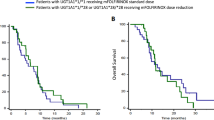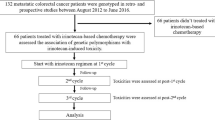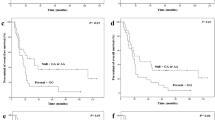Abstract
The aim of this study is to validate the prognostic and predictive value of the non-synonymous cytidine deaminase (CDA) Lys27Gln polymorphism for hematological toxicity and survival using a randomized phase III adjuvant trial (Radiation Therapy Oncology Group (RTOG) 9704) in pancreatic cancer in which one treatment arm received gemcitabine. CDA is involved in gemcitabine inactivation, and there is conflicting data on the role of the non-synonymous CDA Lys27Gln polymorphism in predicting toxicity and survival in cancer patients treated with gemcitabine. RTOG 9704 randomized 538 patients after pancreatic resection to receive radiotherapy with either 5-fluorouracil (5-FU) or gemcitabine. CDA Lys27Gln polymorphism genotype was analyzed. We tested an association between CDA single-nucleotide polymorphism genotype and the survival outcome by the Cox proportional hazard model adjusting for other covariates, as well as toxicity by the logistic regression model. There is statistically significant more severe hematological toxicity in patients treated with gemcitabine with either the homozygote wild-type genotype (Lys/Lys) alone (odds ratio (OR)=0.06, P=0.01), or in combination with the heterozygote (Lys/Gln; OR=0.14, P=0.03) when compared with homozygote variant genotype (Gln/Gln) when adjusted for other covariates. This was not seen in the non-gemcitabine treated arm. There are no genotype differences with respect to survival outcome. In conclusion, in this prospective randomized adjuvant study of patients with pancreatic cancer, the CDA Lys27Gln polymorphism is validated as a predictive marker of gemcitabine hematological toxicity, but not with treatment response or survival.
This is a preview of subscription content, access via your institution
Access options
Subscribe to this journal
Receive 6 print issues and online access
$259.00 per year
only $43.17 per issue
Buy this article
- Purchase on Springer Link
- Instant access to full article PDF
Prices may be subject to local taxes which are calculated during checkout
Similar content being viewed by others
References
Burris III HA, Moore MJ, Andersen J, Green MR, Rothenberg ML, Modiano MR et al. Improvements in survival and clinical benefit with gemcitabine as first-line therapy for patients with advanced pancreas cancer: a randomized trial. J Clin Oncol 1997; 15: 2403–2413.
Mackey JR, Mani RS, Selner M, Mowles D, Young JD, Belt JA et al. Functional nucleoside transporters are required for gemcitabine influx and manifestation of toxicity in cancer cell lines. Cancer Res 1998; 58: 4349–4357.
Tibaldi C, Giovannetti E, Vasile E, Mey V, Laan AC, Nannizzi S et al. Correlation of CDA, ERCC1, and XPD polymorphisms with response and survival in gemcitabine/cisplatin-treated advanced non-small cell lung cancer patients. Clin Cancer Res 2008; 14: 1797–1803.
Tanaka M, Javle M, Dong X, Eng C, Abbruzzese JL, Li D . Gemcitabine metabolic and transporter gene polymorphisms are associated with drug toxicity and efficacy in patients with locally advanced pancreatic cancer. Cancer 2010; 116: 5325–5335.
Monzo M, Brunet S, Urbano-Ispizua A, Navarro A, Perea G, Esteve J et al. Genomic polymorphisms provide prognostic information in intermediate-risk acute myeloblastic leukemia. Blood 2006; 107: 4871–4879.
Okazaki T, Javle M, Tanaka M, Abbruzzese JL, Li D . Single nucleotide polymorphisms of gemcitabine metabolic genes and pancreatic cancer survival and drug toxicity. Clin Cancer Res 2010; 16: 320–329.
Regine WF, Winter KA, Abrams RA, Safran H, Hoffman JP, Konski A et al. Fluorouracil vs gemcitabine chemotherapy before and after fluorouracil-based chemoradiation following resection of pancreatic adenocarcinoma: a randomized controlled trial. JAMA 2008; 299: 1019–1026.
Regine WF, Abrams RA . Adjuvant therapy for pancreatic cancer: current status, future directions. Semin Oncol 2006; 33 (6 Suppl 11): S10–S13.
Garcia-Closas M, Malats N, Real FX, Yeager M, Welch R, Silverman D et al. Large-scale evaluation of candidate genes identifies associations between VEGF polymorphisms and bladder cancer risk. PLoS Genet 2007; 3: e29.
Steemers FJ, Gunderson KL . Illumina, Inc.. Pharmacogenomics 2005; 6: 777–782.
Fisher RA . On the interpretation of χ2 from contingency tables, and the calculation of P. J R Stat Soci 1922; 85: 87–94.
Cox D . Regression models and life-tables. J R Stat Soc 1972; 34: 187–202.
Agresti A . Categorical Data Analysis. John Wiley and Sons: New York, 2002.
Fukunaga AK, Marsh S, Murry DJ, Hurley TD, McLeod HL . Identification and analysis of single-nucleotide polymorphisms in the gemcitabine pharmacologic pathway. Pharmacogenomics J 2004; 4: 307–314.
van Haperen VW, Veerman G, Vermorken JB, Pinedo HM, Peters G . Regulation of phosphorylation of deoxycytidine and 2′,2′-difluorodeoxycytidine (gemcitabine); effects of cytidine 5′-triphosphate and uridine 5′-triphosphate in relation to chemosensitivity for 2′,2′-difluorodeoxycytidine. Biochem Pharmacol 1996; 51: 911–918.
Eliopoulos N, Cournoyer D, Momparler RL . Drug resistance to 5-aza-2′- deoxycytidine, 2′,2′-difluorodeoxycytidine, and cytosine arabinoside conferred by retroviral-mediated transfer of human cytidine deaminase cDNA into murine cells. Cancer Chemother Pharmacol 1998; 42: 373–378.
Bengala C, Guarneri V, Giovannetti E, Lencioni M, Fontana E, Mey V et al. Prolonged fixed dose rate infusion of gemcitabine with autologous haemopoietic support in advanced pancreatic adenocarcinoma. Br J Cancer 2005; 93: 35–40.
Ganti AKP, Nguyen DA, Grem JL . Gene expression profile of enzymes involved in gemcitabine (Gem) metabolism in bone marrow mononuclear cells as predictors of myelosuppression. J Clin Oncol 2006 ASCO Annu Meet Proc Part I 2006; 24 (No. 18S (June 20 Suppl)): 2007.
Gilbert JA, Salavaggione OE, Ji Y, Pelleymounter LL, Eckloff BW, Wieben ED et al. Gemcitabine pharmacogenomics: cytidine deaminase and deoxycytidylate deaminase gene resequencing and functional genomics. Clin Cancer Res 2006; 12: 1794–1803.
Kirch HC, Schroder J, Hoppe H, Esche H, Seeber S, Schutte J . Recombinant gene products of two natural variants of the human cytidine deaminase gene confer different deamination rates of cytarabine in vitro. Exp Hematol 1998; 26: 421–425.
Yue L, Saikawa Y, Ota K, Tanaka M, Nishimura R, Uehara T et al. A functional single-nucleotide polymorphism in the human cytidine deaminase gene contributing to ara-C sensitivity. Pharmacogenetics 2003; 13: 29–38.
Yonemori K, Ueno H, Okusaka T, Yamamoto N, Ikeda M, Saijo N et al. Severe drug toxicity associated with a single-nucleotide polymorphism of the cytidine deaminase gene in a Japanese cancer patient treated with gemcitabine plus cisplatin. Clin Cancer Res 2005; 11: 2620–2624.
Ueno HO, Saijo NT . Association of genetic polymorphisms with survival in Japanese patients treated with gemctiabine (abstract). Eur J Cancer Suppl 2007; 5: 92.
Sugiyama E, Kaniwa N, Kim SR, Kikura-Hanajiri R, Hasegawa R, Maekawa K et al. Pharmacokinetics of gemcitabine in Japanese cancer patients: the impact of a cytidine deaminase polymorphism. J Clin Oncol 2007; 25: 32–42.
Mercier C, Evrard A, Ciccolini J . Genotype-based methods for anticipating gemcitabine-related severe toxicities may lead to false-negative results. J Clin Oncol 2007; 25: 4855; author reply 4855–6.
Mercier C, Raynal C, Dahan L, Ortiz A, Evrard A, Dupuis C et al. Toxic death case in a patient undergoing gemcitabine-based chemotherapy in relation with cytidine deaminase downregulation. Pharmacogenet Genomics 2007; 17: 841–844.
Acknowledgements
JJF and JW were funded by RTOG Seed Grant, NIH K12 Career Development Award in Clinical Pharmacology. HE was funded by the American Society of Therapeutic Radiology and Oncology Junior Faculty Award.
Author information
Authors and Affiliations
Corresponding author
Ethics declarations
Competing interests
The authors declare no conflict of interest.
Rights and permissions
About this article
Cite this article
Farrell, J., Bae, K., Wong, J. et al. Cytidine deaminase single-nucleotide polymorphism is predictive of toxicity from gemcitabine in patients with pancreatic cancer: RTOG 9704. Pharmacogenomics J 12, 395–403 (2012). https://doi.org/10.1038/tpj.2011.22
Received:
Revised:
Accepted:
Published:
Issue Date:
DOI: https://doi.org/10.1038/tpj.2011.22
Keywords
This article is cited by
-
Proof-of-principle studies on a strategy to enhance nucleotide imbalance specifically in cancer cells
Cell Death Discovery (2022)
-
Metabolic syndrome related gene signature predicts the prognosis of patients with pancreatic ductal carcinoma. A novel link between metabolic dysregulation and pancreatic ductal carcinoma
Cancer Cell International (2021)
-
Comprehensive pharmacogenetic analysis of DPYD, UGT, CDA, and ABCB1 polymorphisms in pancreatic cancer patients receiving mFOLFIRINOX or gemcitabine plus nab-paclitaxel
The Pharmacogenomics Journal (2021)
-
Pharmacokinetics and pharmacogenetics of Gemcitabine as a mainstay in adult and pediatric oncology: an EORTC-PAMM perspective
Cancer Chemotherapy and Pharmacology (2016)
-
Cytidine deaminase polymorphisms and worse treatment response in normal karyotype AML
Journal of Human Genetics (2015)



